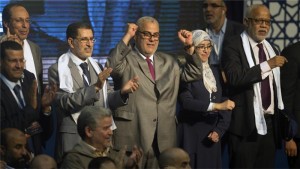Al Jazeera News
Ahmed El Amraoui
The decline of main socialist party prompts emergence of far-left groups offering fresh alternatives for October vote.
Moroccan voters have more than 30 parties to choose from at the upcoming polls [Abdeljalil Bounhar/AP]
A new wave of radical left-wing parties in Morocco is growing, with emerging groups offering fresh political alternatives to the main socialist party, which is in a state of decline.
The rise of the far left comes after a dramatic fall in electoral support for the Socialist Union of Popular Forces Party (USFP), the country’s main leftist party and a genuine opposition force in the 1970s and ’80s, and amid the extreme fragmentation of Morocco’s left, exacerbated by ideological differences and diverse stances on issues such as the constitution, monarchy, elections, and social and economic reforms.
The USFP used to pride itself on being the party of the educated and the urban. Its electoral base is now restricted to districts with high rates of illiteracy.
The beginning of the fall started when USFP decided to join subsequent coalition governments between 2002 and 2011, but failed to play a substantial role.
READ MORE: Morocco election – everything you need to know
The other leftist party, the Party of Progress and Socialism (PPS), has been part of several coalitions, including the outgoing government led by the Islamic PJD party, despite fundamental ideological differences. PPS is now seen as an establishment party and is no longer considered to represent the ideals of the left.
According to Driss Maghraoui, associate professor of history and international relations at Al Akhawayn University in Ifrane, the logic of leftist parties is to change the political system from within. But for many Moroccan socialists, this was not the case.
“Ultimately [the USFP] and the PPS ended up changing themselves but not changing the system, hence losing their legitimacy,” Maghraoui told Al Jazeera.
Ali Sedjari, UNESCO human rights chair and professor of juridical science at Mohammed V University in Rabat, said the decline of the left is a global phenomenon and blames globalisation for the weakening of socialist movements.
“Globalisation has diffused the global [socialist] movement,” Sedjari told Al Jazeera, “and public politics today doesn’t divide itself into conservative and socialist. Public politics has no ideological colour.”
The inferior electoral support of the USFP and the absence of bold progressive strategies from the PPS pave the way for far-left parties to emerge, despite their weak electoral performances so far.
The Democratic Left Federation (FGD), a coalition of three far left-wing parties – the Socialist Democratic Vanguard Party, the National Ittihadi Congress Party, and the Unified Socialist Party (PSU) – is building momentum to form a left-wing political force.
The FGD is backed by some members of the 20 February Movement, a group behind street protests in 2011 calling for social justice, and by the influential Moroccan Association of Human Rights.
Despite the difficulties in reaching out to Moroccan voters, the coalition has managed, as its first step, to generate enthusiasm among left-wing activists and offer a glimmer of hope for the left.
Female trailblazer
One of the FGD’s rising prominent figures is Nabila Mounib, secretary-general of the PSU – one of few female trailblazers in a male-dominated political scene.
For some, Mounib symbolises hope for democracy in a country which, according to many experts, suffers from corruption and widespread apathy.
She was one of the first to criticise King Mohammed VI when he accidentally pardoned a Spanish paedophile who’d been sentenced to 30 years in prison.
She was vocal about her wish for Morocco to become a parliamentary monarchy, in which the king has only nominal power.
After boycotting the 2011 elections to protest against a lack of transparency, the PSU participated in the 2015 local elections and is again hoping to gain ground in this month’s vote.
Many criticised Mounib and PSU for participating in electoral politics, saying it is a sign of the party’s acceptance of the government.
But for Mounib, the tactic of changing the system from the inside is a way to achieve her ultimate goals.
“My country needs intellectuals, needs dedicated people, in politics, in civil society – people capable of fighting for the preservation of the public interest,” Mounib told Al Jazeera.
“For me, it’s a goal of democratisation, a goal of modernisation, a goal of solidarity, a goal of social justice, a goal of equality. I think it’s a very beautiful cause that merits our engagement.”
INTERACTIVE: Morocco votes – the voices of the people
The number of women elected in Morocco still does not meet the country’s minimum 27 percent quota, according to Emma Welford, a Rabat-based member of the International Republican Institute, which trains political parties in democratic processes.
“The key will be for other women to take inspiration from women like Nabila, to have the confidence that they too can be a leader,” Welford told Al Jazeera.
Mounib said one of her main ambitions is to combat apathy and provide a clear platform.
“I’m someone who is ambitious for my party, for my country. I want our struggle to evolve the political system in Morocco,” she said.
With more than 30 parties to choose from, many of which have no clear platform, voters seem to be turning to religion and nationalism to guide their political choices, UNESCO’s Sedjari said.
Referring to what Mounib offers and symbolises, as a female politician with a clear vision and platform, Sedjari said: “We need many Nabila Mounibs.”








